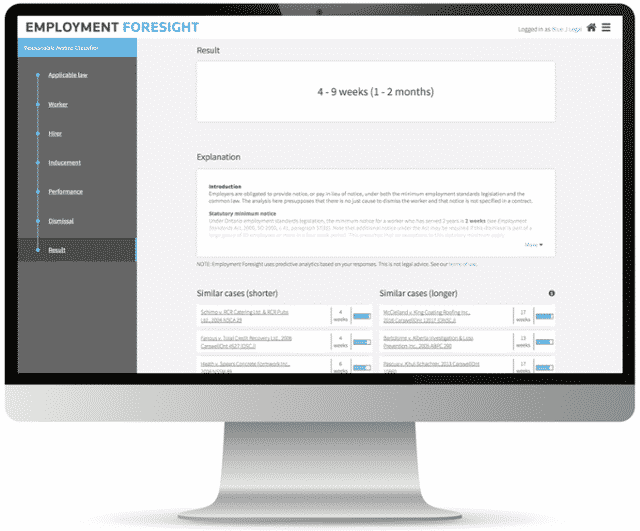Blue J Legal AI software uses artificial intelligence to analyze legal data and predict outcomes. It enhances decision-making and streamlines research for legal professionals.
This article explores the intricacies of Blue J Legal AI, including its features, benefits, applications, and impact on the legal industry.
Understanding Blue J Legal AI Software:

Blue J Legal AI software provides legal professionals with powerful analytical tools that harness artificial intelligence. It helps lawyers and paralegals navigate complex legal data and make informed decisions. By utilizing advanced algorithms, Blue J can analyze vast amounts of legal information efficiently and accurately.
Key Features of Blue J Legal AI Software:
Several standout features make Blue J Legal AI a valuable asset for legal professionals:
- Predictive Analytics: Forecasts legal outcomes using historical data.
- Legal Research Automation: Saves time and reduces workload for practitioners.
- Customized Reporting: Generates tailored reports to highlight essential information.
- User-Friendly Interface: Facilitates easy navigation for users.
- Integration Capabilities: Enhances utility within a law firm’s technology stack.
Benefits of Using Blue J Legal AI Software:
Incorporating Blue J Legal AI into legal practices offers numerous advantages for professionals:
- Enhanced Efficiency: Automates routine tasks, enabling focus on higher-value activities.
- Improved Accuracy: Uses predictive analytics for data-driven decision-making.
- Cost Savings: Streamlined workflows reduce research time and associated costs.
- Better Client Outcomes: Advanced analytics lead to more informed legal strategies.
- Collaboration: Fosters teamwork through shared insights and collective strategies.
Applications of Blue J Legal AI Software:
Blue J Legal AI is versatile and applicable in various legal contexts. Its primary applications include tax law, where it analyzes complex regulations to provide actionable insights. In employment law, Blue J assists lawyers in navigating disputes with data-driven insights on claims.
Family law practitioners leverage Blue J to analyze custody and divorce cases effectively. In intellectual property law, it helps assess potential infringement issues and predict outcomes accurately. Furthermore, it is useful in corporate law for compliance analysis and risk assessment.
Also Read: What Software Does Electrical Estimators Use – Popular Tools in the Industry!
The Technology Behind Blue J Legal AI:
Blue J Legal AI employs advanced machine learning algorithms and natural language processing (NLP) to analyze legal data. These technologies enable the software to comprehend complex legal language and context effectively.
Machine learning algorithms continuously enhance predictive accuracy as more data is processed. Natural language processing allows Blue J to interpret legal documents, extracting relevant information and identifying key legal principles. The platform’s scalability is also noteworthy, adapting to the growing data needs of legal firms efficiently.
The Impact of Blue J Legal AI on the Legal Industry:

The introduction of Blue J Legal AI has significant implications for the legal industry at large. As law firms adopt this technology, transformative changes are expected across practices. A shift towards data-driven strategies is evident, with legal professionals relying more on empirical evidence.
Increased competition will emerge as more firms adopt AI tools, giving an edge to those that deliver faster and more accurate services. The roles of legal professionals may also change, leading to a demand for individuals skilled in interpreting data.
Challenges and Considerations:
While Blue J Legal AI offers numerous advantages, various challenges must be addressed by law firms considering its adoption:
- Data Security: Protecting sensitive legal information is a primary concern; compliance with privacy regulations is essential.
- Training and Adaptation: Comprehensive staff training is necessary for effective implementation of the new technology.
- Ethical Considerations: Maintaining human oversight in legal decisions is crucial for responsible AI usage.
- Bias in Algorithms: Firms must be vigilant about potential biases in AI that could impact legal outcomes.
Best Practices for Implementing Blue J Legal AI Software:
To maximize the benefits of Blue J Legal AI, law firms should follow several best practices. Conducting a needs assessment is essential to align the software with specific operational goals. Providing comprehensive training enables legal professionals to utilize the software effectively.
Fostering a culture of innovation encourages acceptance of technology and enhances its integration into daily operations. Ensuring compliance with data protection regulations safeguards sensitive information, while continuous user feedback helps improve the software’s practical application.
Also Read: How To Include Software Skills In Resume Reddit – A Comprehensive Guide!
The Future of Blue J Legal AI Software:
As the legal industry continues to evolve, the future of Blue J Legal AI software looks promising and full of potential. Continued development of AI technologies will further enhance the software’s capabilities and efficiency. Expanding market adoption is likely as the benefits of legal AI become more widely recognized among practitioners.
Integration with emerging technologies, such as blockchain and smart contracts, could revolutionize the legal landscape, creating new opportunities. Ongoing research in AI ethics will ensure responsible implementation, mitigating potential risks associated with AI use.
FAQ’s
1. What is Blue J Legal AI Software?
Blue J Legal AI software uses artificial intelligence to analyze legal data and predict outcomes, enhancing research and decision-making.
2. How does Blue J improve legal research?
Blue J automates legal research processes, quickly identifying relevant case law and statutes, saving valuable time for professionals.
3. In what areas of law is Blue J most useful?
Blue J is particularly effective in tax law, employment law, family law, and intellectual property law contexts.
4. What technology powers Blue J Legal AI?
Blue J utilizes machine learning algorithms and natural language processing to analyze legal data and generate actionable insights.
5. What are the ethical considerations of using Blue J?
Firms must ensure human oversight remains integral to decision-making processes and prioritize data security and compliance regulations.
Conclusion
Blue J Legal AI software significantly enhances legal practice efficiency and decision-making capabilities. By adopting this innovative tool, legal professionals can improve client outcomes and adapt to a rapidly changing industry landscape. Its powerful analytics foster smarter, data-driven strategies that benefit both firms and clients.



